Defence Minister Mario Banožić: Reintroducing Conscription Being Considered
ZAGREB, 26 May, 2021 - Defence Minister Mario Banožić said on Wednesday the reintroduction of conscription was being considered and that, although he was sure it was the right move, he felt that Croatian society still had to deal with this subject a lot.
Speaking on Croatian Radio, Banožić said he tried to research the subject in recent months.
He said almost two in three citizens supported mandatory military service, but added that the motive for introducing it was important, and that was security and stability.
Parents are for introducing conscription first and foremost as an educational measure, which is not the right motive, he said.
Croatia needs security, stability and serving one's country as the motive, ideals which are the foundations of the Croatian army, courage and the desire to feel secure and whole, Banožić said.
Croatian society still has to deal with this subject a lot, but reintroducing mandatory military service is the right step, he added.
Asked if there was a road map and when that could be expected, he said that for now the ministry was researching public opinion and how to manage the process because of the sensitive subject.
Especially considering that once you abandon such a model, bringing conscription back is a much tougher challenge, he added.
For more about the army in Croatia, follow TCN's dedicated page.
Slovenian PM Supports Croatia's Schengen Entry
ZAGREB, 26 May, 2021 - Slovenian Prime Minister Janez Janša on Wednesday supported the Schengen entry of Croatia, Bulgaria and Romania as it would strengthen security in Europe.
We support Croatia's entry to the Schengen Area, as well as the entry of Bulgaria and Romania. We believe those are steps that strengthen security in Europe, he told a joint press conference with European Parliament President David Sassoli.
He spoke at the press conference via video link from Ljubljana after presenting to European Parliament leaders the priorities of the Slovenian presidency of the Council of the EU, which starts on 1 July.
Croatian PM Andrej Plenković said in Brussels on Tuesday he expected Croatia's Schengen membership could be on the agenda during the Slovenian presidency.
"Croatia is on the right track to become a member of the Schengen Area in 2022 and then to enter the eurozone. I think that's possible. When we look at the very good relations we now have with Slovenia, it would be a great scenario if something like that happened during Slovenia's presidency of the Council of the EU," he told the press.
Janša today also supported EU enlargement to the Western Balkans, saying many problems there, including the border issue, would be taken off the agenda with the accession of those countries.
EU enlargement is in our common interest. It should be our strategic response to numerous challenges, he added.
He said that when the EU was dealing with the financial and then the migrant crisis, neglecting enlargement, some other factors started expanding their influence in the Western Balkans.
Those foreign factors don't have the same values as we in the European Union, he added.
Janša said a European perspective was the answer.
We can solve problems by making borders less important. Slovenia is now part of the European Union and Schengen, where there are no physical borders, he added.
He announced an EU-Western Balkan summit for 6 October in Slovenia.
As for the priorities of Slovenia's EU presidency, Janša highlighted respect for the rule of law and EU resilience to crises. He also underlined the importance of the Conference on the Future of the EU, which will end next year during the French presidency.
For more about diplomacy in Croatia, follow TCN's dedicated page.
Photo Exhibition For Croatian Army's 30th Anniversary
ZAGREB, 26 May, 2021 - On the occasion of the 30th anniversary of the establishment of the Croatian Army and Croatian Ground Army Day, the Dr Franjo Tuđman Military Academy organised a photo exhibition, with each photo representing one year of the army's existence.
The exhibition may be seen from today until 3 June and from noon to 8 pm every day at the Zagreb Student Centre's French Pavillion, the Defence Ministry said in a press release.
The exhibition will also be shown at the Zagreb National and University Library until 31 May from 8 am to 9 pm on weekdays and from 9 am to 2 pm on Saturday.
For more about politics in Croatia, follow TCN's dedicated page
JANAF, OMV Sign First Oil Storage Contract
ZAGREB, 26 May, 2021 - The JANAF oil pipeline and storage system said on Wednesday it had signed its first contract with Austria's OMV Supply & Trading Ltd for storing up to 99,000 cubic metres of crude oil at the Omišalj Terminal for a period of two years.
Management said the contract confirmed JANAF's strong export orientation, adding that the company generated over 60% of its revenue from foreign clients.
The new contract ensures the further use of our storage capacity and stable business in the longer term, Management Board chairman Stjepan Adanić and Board member Vladislav Veslica said.
For more about diplomacy in Croatia, follow TCN's dedicated page.
Friends of Croatia: UNICEF - Croatia an Example to the World When it Comes to Breastfeeding
May 27, 2021 - The sixth article in the "Friends of Croatia: UNICEF" series explores the work of the UNICEF Office for Croatia. What is done regarding children's rights in Croatia, positives, and negatives, and how can you help if you want to?
To ensure that our world even stays the same, let alone improves, new generations are essential. But, before they grow old enough to participate in society, society must first take care of the youngest ones to grow and develop. Society must ensure for kids that they grow up in families filled with love, make sure that kids can go to school, that they are healthy, safe from violence, that they are not hungry or thirsty, and give them overall opportunity to make it in the world.
Basically, children have rights, and they are in more detail elaborated in 54 articles. For more details, have a look at the Convention on the Rights of the Child that came to power on September 2, 1990, by the United Nations (UN) General Assembly.
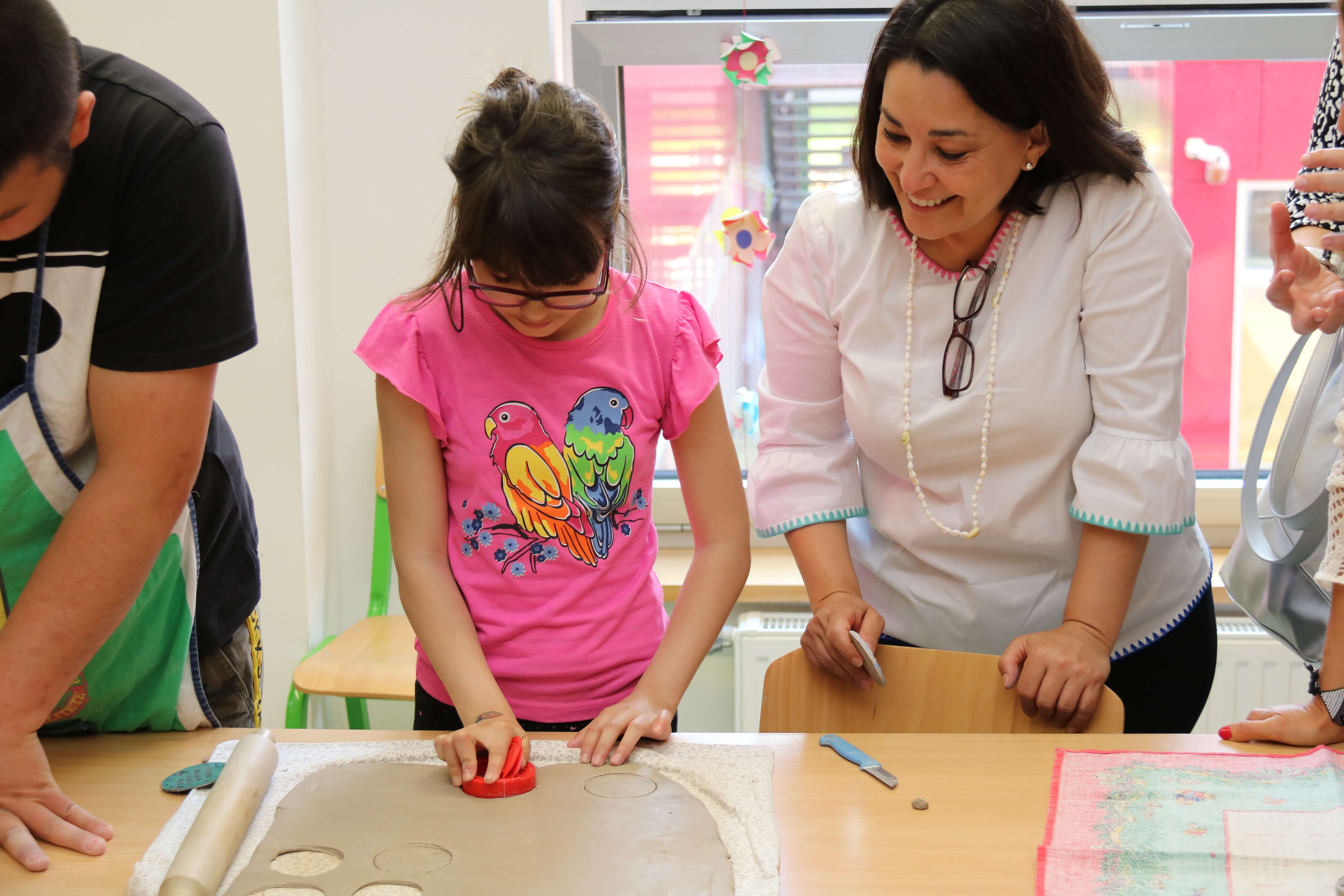
Regina M. Castillo, UNICEF office for Croatia representative with children with disabilities in Centre Tomislav Špoljar in Varaždin © Marin Ilej/UNICEF
The UN is dedicated to seeing this Convention is being respected, and United Nations International Children's Emergency Fund, commonly known as UNICEF, specializes in the issues of children's rights. Established in the aftermath of World War II, UNICEF has been at the frontlines of humanitarian crises, armed conflict, and natural disasters.
„Undeterred by the scale of the crises, we rise to the challenge, reimagine what is possible and respond by helping millions of children survive and thrive. Our on-the-ground expertise has reached more than 191 countries and territories, through committed partnerships and a passion for innovation“, says UNICEF on its official website.
Croatia signed and agreed with the Convention, and UNICEF today has its own office in Zagreb. Furthermore, it's worth noting that UNICEF has existed for 75 years, and despite firstly coming to Croatian territory while the country was part of the former Socialist Federal Republic of Yugoslavia, UNICEF has been with Croatia since the organization was established.
„Many people do not know that UNICEF helped to eradicate malaria in Croatia and that UNICEF played a key role in the development of modern dairy. Dairies were built in Zagreb, Rijeka, and Split, and factories for the production of powder milk in Osijek and Županja. Milk was distributed in schools, and for many children, it was their only meal during the day“, says Regina M. Castillo, UNICEF Office for Croatia representative.
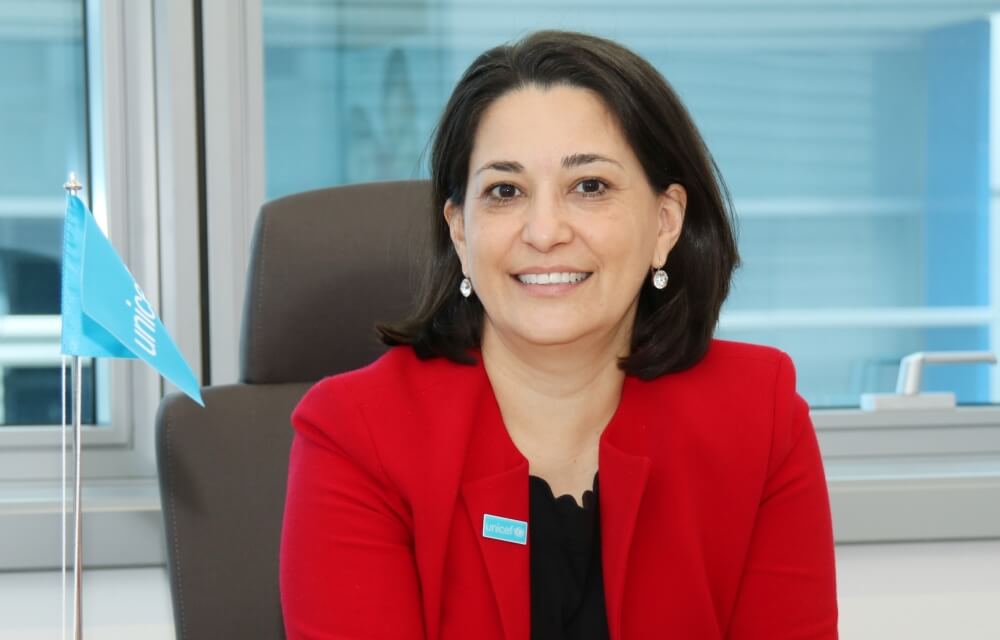
Regina M. Castillo, UNICEF office for Croatia representative © Marin Ilej/UNICEF
The UNICEF representative is elected for a five-year mandate, and Regina M. Castillo came to her function in Croatia in 2019. Her career in the UN started in 2001 and was in charge of economic and social questions in the Executive Office of the UN chief secretary Kofi Annan in New York. This was followed by Castilla moving to work in the mutual program for HIV/AIDS, known as UNAIDS. She was first the director of private sector partnerships in Geneva (2006-2012) and then moved to be the director for Bolivia, Ecuador, and Peru (2012-2015). She majored in International relations and public politics.
Born in Nicaragua, she first started her career in the 1990s as a diplomat, and she was also the headmistress for international trade in the Nicaraguan Trading Ministry.
Helping Croatia before it was cool (or an independent country)
Castillo went on to continue that after World War 2, UNICEF fed six million children every day, which included many children in Croatia.
„One of those children was our dear colleague, prof. Josip Grgurić, who is still working tirelessly for the youngest. He still remembers the yellow cheese that was part of UNICEF's humanitarian package for families, as well as the chocolate that he then tasted for the first time. He later worked at the children's hospital in Klaićeva, which UNICEF helped found, and he still works hard on UNICEF’s Child-Friendly Hospital Initiative“, says Castillo indicating how valuable but also inspiring UNICEF can be to children. Castillo added that in the Homeland War, UNICEF was the first organization on the ground, making sure that children and families received the necessary psychosocial support and humanitarian packages. After the war, they educated children on how to protect themselves from landmines.
Today Croatia developed, joined NATO and EU, and is a modern European country. With such progress, there have been many improvements in respect to children and their rights.
„Croatia has a low mortality rate of children under the age of five, extremely low stunted growth rate due to inadequate nutrition in the first years of life and the enrolment rate of children in primary school is almost 100 per cent“, pointed out Castillo.
„Croatia is an example in the world when it comes to the promotion of breastfeeding. It is rare that all public maternity wards in a country have the status of 'Child-Friendly Hospital'. With the support of UNICEF, partners have organized a network of breastfeeding support groups, and now we have more than 200 support groups in Croatia“, added Castillo on what the world can look up to this small South-Eastern European country.
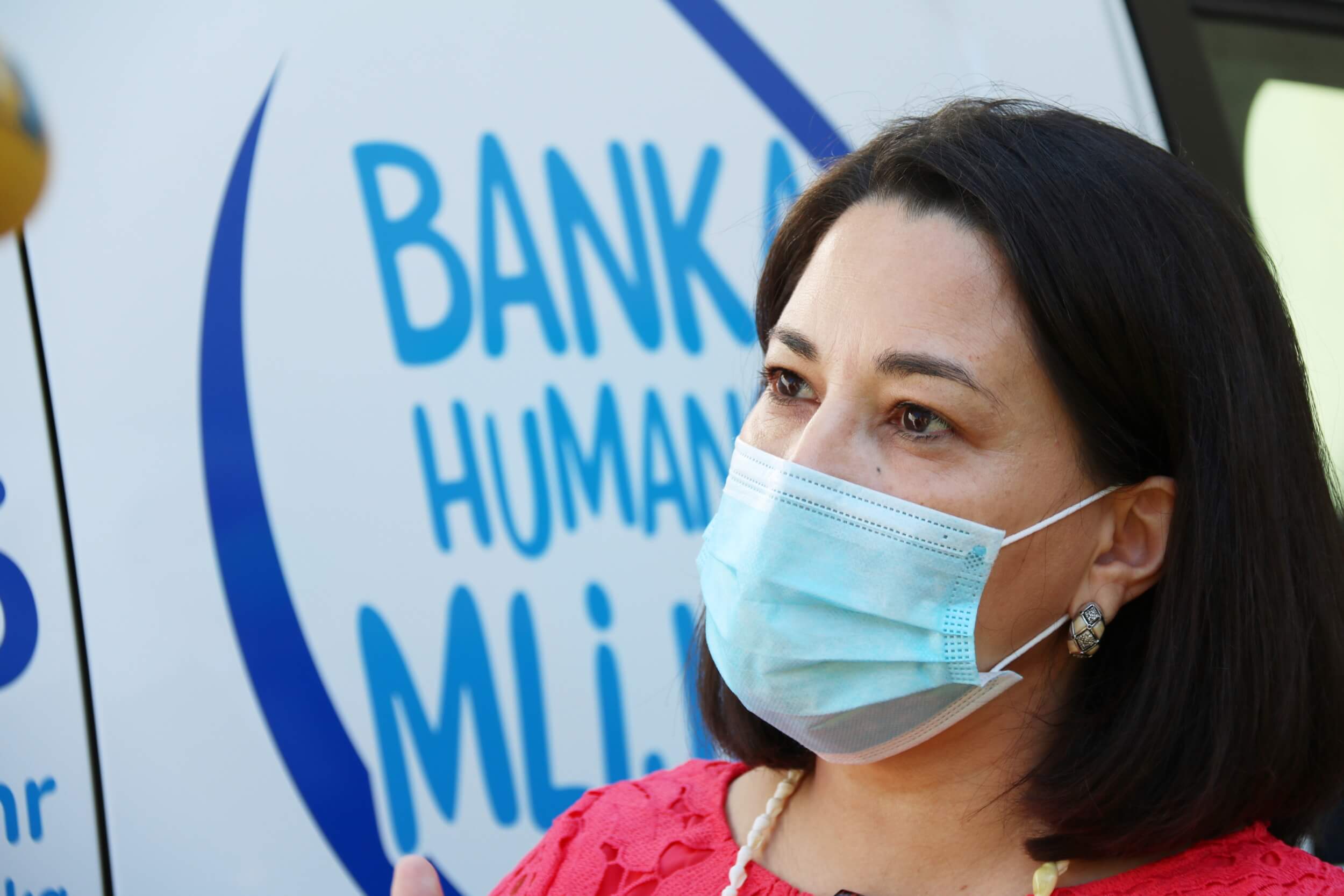
Regina M. Castillo at Human milk bank © Marin Ilej/UNICEF
Still, there are some issues Croatia needs to address and are far from ideal at the moment.
„There are still differences when it comes to access to services for children, depending on where they live and the conditions in which they grow up. Children with disabilities, as well as children from the poorest families, especially in rural areas, often do not have the opportunity to attend kindergarten and do not have the same access to specialized health services and therapies as children in urban areas. The focus of UNICEF in Croatia is on the most marginalized children: children with disabilities or developmental delays, children growing up without adequate parental care, children from minority groups, children at the risk of poverty and exclusion. UNICEF’s programs are focused on the well-being and protection of every child, with a special focus on the most vulnerable children“, pointed out Castillo.
Campaigns and programmes such as “Every child needs a family”, “The first three are the most important”, and “Stop violence among children” are perhaps the most known public action by UNICEF in Croatia, but returning to the good practices of breastfeeding, Castillo emphasizes the establishment of the Human Milk Bank in her current mandate.
„Thanks to the Human Milk Bank, prematurely born and seriously ill newborns (who do not have access to their own mother's milk) can receive milk donated by other mothers. We continually work on reducing the risk of disasters, support the development of quality foster care and provide support to parents in the upbringing and care of children through workshops and we work a lot with young people“, said Castillo.
In general, UNICEF has different types of offices in countries, and regarding the Croatian office, it’s a Country Office. In other words, most of the resources (human and financial) are invested in programs in Croatia. Castillo says that the five-year mandates have priorities that are determined in cooperation with partners. And while 80 percent of the funds raised are invested in programs for girls and boys in Croatia, there are funds and support programs for children outside of the country.
“For example, in 2018, UNICEF supported child health care in parts of Ukraine affected by the conflict and helped the building of five inclusive children's playgrounds in two refugee camps in Jordan in cooperation with the Ministry of Foreign and European Affairs in 2019. Through the ‘Schools for Africa’ program , which includes many kindergartens and schools throughout Croatia, UNICEF supports the education of girls and boys in Madagascar", Castillo listed several examples.

Regina M. Castillo, UNICEF office for Croatia representative with children on Media Literacy days press conference with Radovan Fuchs Minister of Science and Education, Krešimir Partl, State Secretary at Ministry of culture and media and Robert Tomljenović, Deputy Director of the Council for Electronic Media © Marin Ilej/UNICEF
Overall, the UNICEF Office for Croatia works closely with the Croatian Government, and most notably, with the Ministries of Social Welfare, Education, Health, and the Ministry of Foreign and European Affairs. Other partners also include experts (Croatian experts, but also building on expertise and good practice from all over the world), professional associations, academia, services providers, and NGOs.
“UNICEF’s goal is to connect all stakeholders and to advocate and support systemic change for the well-being of all children. System change is a gradual process, and it can be challenging, but when it comes to children’s rights, every step forward is well worth the effort”, explained Castillo.
Croatian citizens showing support for UNICEF
On one hand, Croatia is a good country with low mortality rates of kids and a role model for breastfeeding promotions. On the other hand, however, peer to peer violence (on whose suppression the aforementioned “Stop violence among children“ campaign works heavily on), and unequal approach to education between rural and urban areas show Croatia has both its ups and downs. Unfortunately. The downside sometimes overshadows all the positive things.
One such instance was the tragic death of a two-year-old girl from Nova Gradiška on Easter Sunday. The death of a severely injured girl, who was brought to Zagreb's children's hospital after suffering abuse and heavy beating from her biological parents (and from whom the girl was taken and given to a foster family but was then returned back to biological parents), sparked controversy and citizens outrage, culminating in changes in social welfare law, as well as sacks and investigations in the welfare center in Nova Gradiška.
„We are deeply saddened by the tragic death of two-and-a-half-year-old Nikoll on Easter Sunday. There are no words to express the pain of such a terrible event. Unfortunately, there are no simple and quick solutions to prevent violence against children. For years, UNICEF in Croatia has been continuously and persistently working in the field of child protection, educating experts from the social welfare system, but also other experts who work with children and families, such as experts from the health care, education, and justice systems. UNICEF implements various support programs for parents, and it is fully committed to the development of foster care and the improvement of the legislative framework. However, UNICEF is also aware that society as a whole, has a long way to go to achieve the goal that every girl and every boy is guaranteed the best possible care and protection. UNICEF will continue to work actively, persistently, and dedicatedly with all partners to achieve it”, commented Castillo.
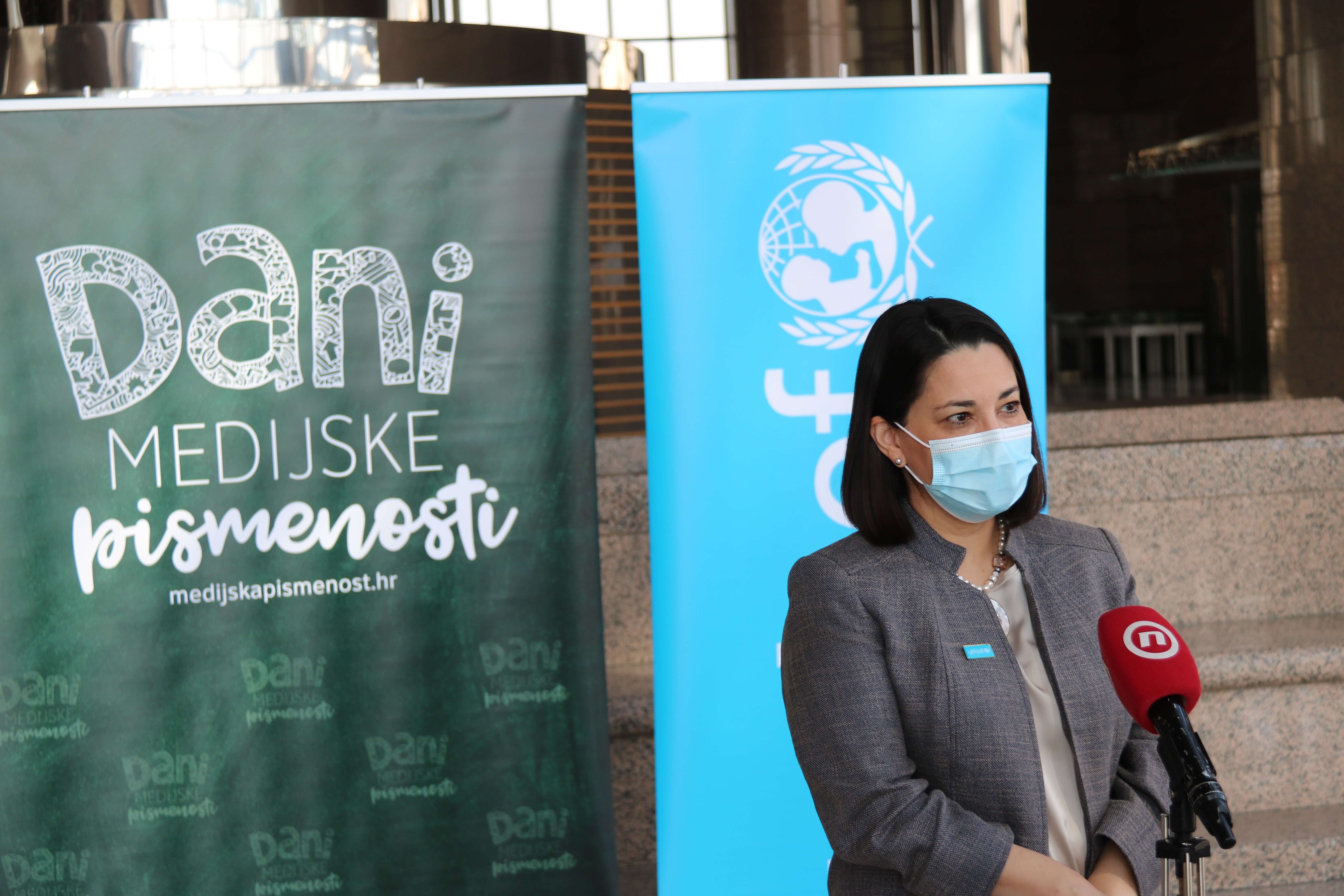
Regina M. Castillo talking on Media Literacy days press conference © Marin Ilej/UNICEF
However, Croatians recognize the importance of the UNICEF mission. Before Covid, UNICEF annually collaborated with the Museum of Illusions on the Museum of Reality exhibition which displayed the problems children faced worldwide, but which also showed what changes and solutions UNICEF brought to those areas.
“Experience tells us that citizens are ready to support the youngest, in Croatia and beyond. Implementation of our programs would not be possible without the support from citizens and companies that placed the focus of their CSR activities precisely on children. We especially value the support from our Childhood Guardians, donors who support our work with regular monthly donations and allow us to regularly conduct our programs for boys and girls, as well as react quickly with much-needed assistance in crisis situations like the earthquakes in Croatia and the COVID-19 pandemic that affected all families. UNICEF is always in the field with the most vulnerable children and their families”, notes Castillo.
In the end is important to note, that while children are recognised as a particularly vulnerable group, all human rights apply equally to children.
“All the rights enshrined in the Convention apply to every child, regardless of a child’s country of origin, gender, religion, and nationality. Every child, by birth, has all his/her rights, the right to grow up in a safe environment, to have a family, to have access to health care and education, to be able to play and develop his/her interests and reach his/her full potential”, concludes Castillo.
The five-year mandate is an agreement that sets priorities in advance, so Castillo warned that there is no opportunity for making donations outside of that framework. UNICEF office occasionally does get messages from citizens who need advice or help on issues outside of that frame, but nevertheless, UNICEF can offer them help by referring them to institutions and addresses that can offer citizens the necessary support, financial support, or information.
With expertise mentioned several times throughout this story as the insurance of delivering the best solutions to issues children face, UNICEF is always on the lookout for new people. If you want to make a change in the world while earning a fair wage yourself, check out what expertise UNICEF is looking for right now.
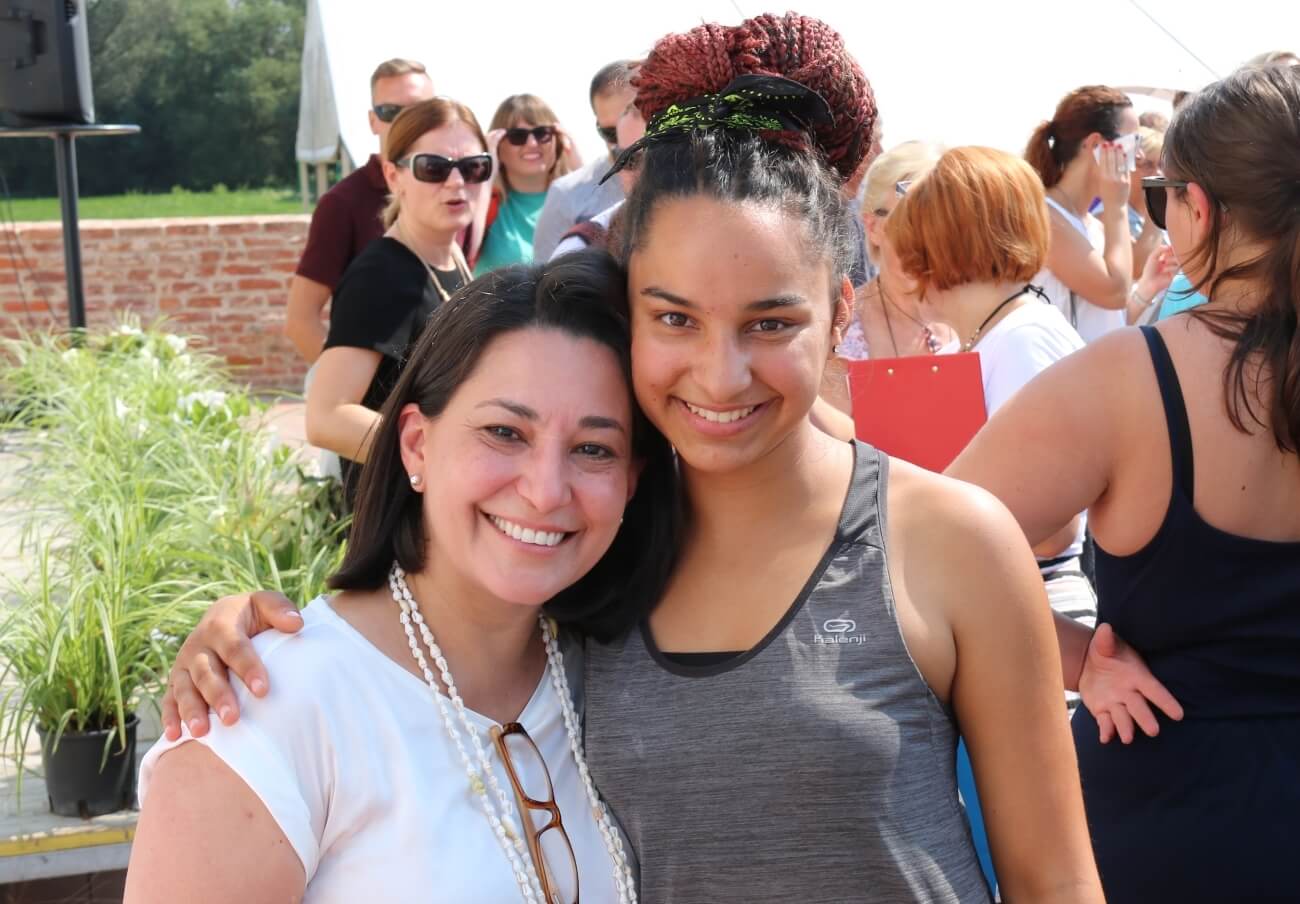
Regina M. Castillo on a foster family gathering © Marin Ilej/UNICEF
UNICEF Croatian Office is situated on Radnička cesta 41/7. To inform the public of their work, they built a considerable presence on Facebook, Twitter, Instagram, Youtube, and Linkedin. You can also find all UNICEF-related info for Croatia on their official website, and contact them via mail: This email address is being protected from spambots. You need JavaScript enabled to view it. or on phone numbers: +385 1 2442 660 and +385 1 2442 661. You can use the website to donate to a cause in Croatia too. Additionally, there are numbers: +385 1 4095 855, +385 99 2692 196, and +385 91 621 1039 for more details on donating to Croatia as well as e-mail address This email address is being protected from spambots. You need JavaScript enabled to view it.. You can also leave a donation to UNICEF in your will, and a phone number +385 1 3031 640 specializes for the issue in Croatia. If you find yourself in Croatia and you want to volunteer for UNICEF, more info can be found by sending a mail to This email address is being protected from spambots. You need JavaScript enabled to view it. and on phone number +385 1 3031 646.
And of course, you can donate for a good cause to UNICEF for any action the fund is internationally involved in.
To read more from the series "Friends of Croatia", follow TCN's dedicated page.
For more about UNICEF in Croatia, follow TCN's dedicated page.
Members of Parliament Hope For Revival of Capital Market
ZAGREB, 26 May, 2021 - Amendments to the Capital Market Act, which are aimed at further aligning Croatia's regulatory framework with the EU acquis, were supported on Wednesday by both the Opposition and the ruling majority in the parliament, who expressed hopes for the revival of the capital market.
This is one of the most complicated laws that summarises what kind of capital market Europe wants, said Social Democrat MP Boris Lalovac, warning that Croatia's capital market was far less developed than the European.
"The value of the capital market in Croatia is HRK 276 billion, 140 billion are stocks and 130 billion securities, the annual turnover of the Zagreb Stock Exchange is around HRK 3 billion while the turnover on the OTC market is HRK 27 billion," Lalovac said.
That shows that outside of the stock exchange and capital markets, which have strict rules, trading is ten times greater, Lalovac said, expressing hope this would change.
Grozdana Perić of the HDZ said that better oversight and regulation would enable further development of the capital market in Croatia.
She warned, however, that the coronavirus crisis had caused an outflow of funds from investment funds and that their value had dropped by more than 35% or HRK 8 billion.
That is one of the reasons for amending the law, said the State Secretary at the Finance Ministry, Stjepan Čuraj, who presented the amendments to MPs.
"If we take as an example the Zagreb Stock Exchange alone, during the pandemic in 2020 it dropped by more than 35%, from 2,000 to 1,300 basis points," Čuraj said, noting that there was room for improvement.
For more about politics in Croatia, follow TCN's dedicated page.
Tomislav Tomašević: War Veterans Programmes Won't be Halted, City Offices to be Merged
ZAGREB, 26 May, 2021 - Zagreb mayoral candidate Tomislav Tomašević said on Wednesday it was not true that city programmes for war veterans would be halted once his We Can! party came to power but that rather city offices would be merged to improve coordination of city programmes.
"As regards accusations that programmes intended for war veterans would stop if we come to power, I can say that that is not true. I have said on more than one occasion that we will merge offices, I was not speaking about the cancellation of programmes, because I do not know of any other capital city in the world that has 27 departments," Tomašević told a news conference.
On being given police protection
Asked by reporters if he had been given police protection, Tomašević told reporters to ask police about that because security assessment was not what he and his colleagues did.
"We have been in touch with police regarding security risks. But the police are the ones to make decisions on the matter, and I cannot speak on their bahalf about that," Tomašević said.
Asked about the Otvoreno political programme on Croatian Television of Tuesday, in which he faced off against his rival in the 30 May runoff for Zagreb mayor, Miroslav Škoro of the Homeland Movement, and if he would sue him for false claims, Tomašević said that he was focused on his campaign now.
"That did not happen only yesterday. We are talking about an unbelievable misrepresentation of facts, someone is accusing you of covert campaign financing while at the same time they report zero donations," said Tomašević.
He noted that the internet was full of paid advertisements with false information on the We Can! platform and his family.
He added that Željka Markić of the In the Name of the Family civil society group yesterday made one more slanderous claim against him, saying that he had a gross salary of HRK 25,000 in a nongovernmental organisation.
"She should say which NGO she was referring to and when it happened," he said, noting that an unprecedented hate-mongering campaign was under way on the political scene in Croatia.
For more about politics in Croatia, follow TCN's dedicated page.
REPLACE Project from Horizon Europe: Third Primorska-Goranska County Renewable Energy Meeting Held in Rijeka
May 26, 2021 - With Energy Institute Hrvoje Požar (EIHP) being the lead partner, the REPLACE Project from Horizon Europe steadily continues the progress of renewable energy for the Kvarner region.
Earlier in January, TCN wrote about Croatian energy development, whose goal is to be based on clean technologies. And that it's not all empty talk, as shown by the third meeting of a local workgroup enrolled in the REPLACE Project. As Energy Institute Hrvoje Požar (EIHP) reports on its website, the REPLACE Project has a goal of supporting European energetic, climate, environmental, economic, and social goals with the deadline until 2030 and 2050.
As part of the OBZOR 2020 (Horizon Europe) EU program for research and innovations in the 2014-2020 time frame, the REPLACE Project receives EU funding. Twelve partners from nine countries participate in the project, and EIHP is in charge of the project activities in Primorska-Goranska county. In support of European goals, the plan of REPLACE Project is to gradually switch the current ineffective and outdated heating and cooling systems with new efficient systems which rely on renewable energy.
The meeting held at the Faculty of Economics at the University of Rijeka saw Dražen Balić, Antonia Tomas Stanković, and Lea Leopoldović from EIHP hold lectures presenting results of the first period of the project, but also the plans for future activities. The accent was put on implementing campaigns and collective actions supported by the members of the local workgroup. Energetic poverty, gender aspects, and „lock-in effect“ (an economic practice, where a company makes it extremely hard for their customers to leave them, even if the customer wants to) are the obstacles the project runners are aware of and were explained in greater detail. Another thing that stood out in the presentation was the presentation „Technology of Blue Energy in Croatia“, which presented modern technologies used in heating and cooling in coastal areas, and applicable to the Primorska -Goranska county.
Key institutions in the regions such as REA Kvarner (regional energy agency), Energo Rijeka (gas and heat energy provider), representatives of the Primorska-Goranska county, OIE Hrvatska (The economic-interest association The Renewable Energy Sources of Croatia - RES), and Rijeka Consumer Centre were present at the meeting, showing that the motivation to bring energy efficiency in Primorska-Goranska County is in its full strength. Both on corporal, political, and expert levels.
Learn more about Rijeka on our TC page.
For more about science in Croatia, follow TCN's dedicated page.
Montenegrin Health Minister Jelena Borovinić Bojović Thanks Croatia For Vaccine Donation
ZAGREB, 25 May, 2021 - Montenegrin Health Minister Jelena Borovinić Bojović said in Zagreb on Tuesday that Croatia's donation of 10,000 vaccine doses was significant for Montenegro's efforts to inoculate its population against COVID-19.
In early May the Croatian government decided to donate 30,000 doses of coronavirus vaccines to Bosnia and Herzegovina and 10,000 doses each to Montenegro and Kosovo.
After meeting with her Croatian counterpart Vili Beroš, Borovinić Bojović thanked Croatia for that "big friendly gesture and great solidarity."
The donation of 10,000 doses will be "very significant in the process of mass inoculation that is currently underway in Montenegro," she said.
Croatia's Health Minister Vili Beroš underscored that Croatia's care for its neighbouring countries.
"I hope that we will contribute at least a little in the fight against this disease," said Beroš.
The two ministers discussed cooperation in the transplantation programme with Borovinić Bojović underscoring that Croatia has "shown especially good will to help us in resolving that problem."
She added that they discussed the signing of a memorandum of understanding that would enable Montenegrin doctors to come to Croatia for further training regarding transplantation surgeries.
The Croatian transplantation programme has been recognised beyond the borders of our country, said Beroš.
He underscored Croatia was willing to help Montenegro in that regard.
For more about politics in Croatia, follow TCN's dedicated page
Remaining Mine-Infested Areas to be Cleared of Mines By Mid-2026
ZAGREB, 25 May, 2021 - Interior Minister Davor Božinović said on Tuesday that until the spring of 2026 the remaining 250 square kilometres of land believed to be infested with landmines left over from the 1991-1995 Homeland War would be cleared of those explosive devices.
Božinović commented on the plan for a mine-free Croatia at a ceremony in the town of Josipdol, where he presented a HRK 241 million project, Karlovac KARST, for the removal of mines from forests in the areas of Karlovac and Josipdol.
The implementation of the project will create prospects for job creation in the region, he added.
Karlovac County Prefect Martina Furdek Hajdin said that HRK 188 million had been absorbed from the European Union for the Karlovac KARST project.
In the next few years, 17.1 square metres of forest land in Tounj, Josipdol, Plaški, Saborsko and Rakovica will be cleared of landmines, she added.
The county prefect added that Karlovac County had already tapped HRK 29 million from the EU funds to remove landmines from 3.8 square-metre-large farmland.
For more about politics in Croatia, follow TCN's dedicated page


